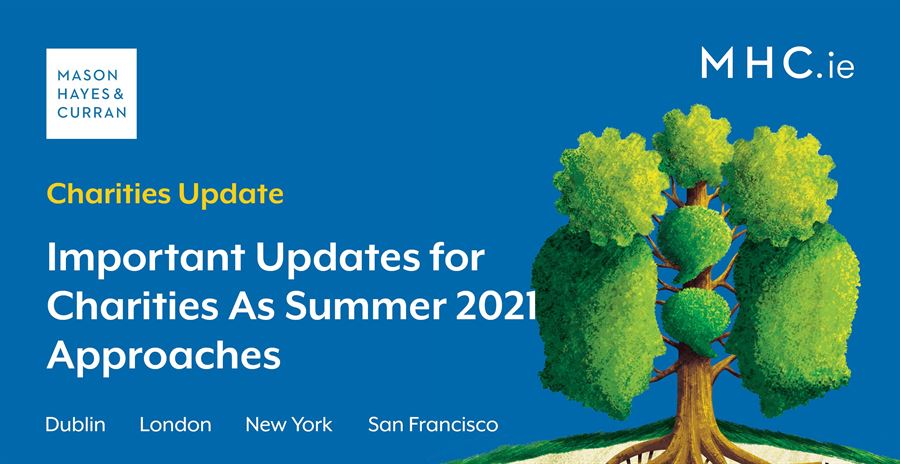
As summer 2021 approaches and relaxation of COVID-19 restrictions bring the promise of a return to normality for us all, charities still need to be cognisant of several ‘business as usual’ compliance points. We provide a reminder of obligations that require attention this year.
New Regulations regarding the Beneficial Ownership of Trusts
New regulations are now in place relating to trusts based in Ireland and the identification of their beneficial owners. The title of the regulations is The EU (Anti-Money Laundering: Beneficial Ownership of Trusts) Regulations 2021 and they came into force on 24 April 2021.
What does this mean for your charity?
If your charity is a trust or unincorporated association holding property on trust, then the trustees must take reasonable steps to obtain and hold adequate, accurate and current information in respect of the trust’s beneficial owners. For charitable trusts, the beneficial owners will mean the trustees, any committee or governing body managing the trust and any other person with control. Information required includes the name, address, date of birth and nationality as well as PPS number. The trustees must now maintain an internal register with details of these persons and file the relevant information in the central register. This must then be established by the Revenue Commissioners, by 24 October 2021. New trusts must file on the central register within 6 months.
If your charity is a company, the directors are already required to maintain a register of beneficial owners and to file details on the central register maintained by the Registrar of Companies. The 2021 Trust Regulations clarify that where a charitable company holds property on trust, and has already filed the required information on beneficial ownership on the central register for companies, this can satisfy the charitable company’s obligations under the 2021 Trust Regulations. However, the trustees need to create a record of this reasoning.
Designated entities such as financial institutions, investment managers and professional advisors are required to make enquiry as to beneficial ownership of clients. Charities may find this enquiry is raised for example, on opening new bank accounts or dealing with investment property, so it is important that the trustees comply with the 2021 Trust Regulations. Trustees should also note that there are criminal sanctions for failure to comply with the 2021 Trust Regulations.
The Approved Housing Bodies Regulatory Authority
Many of our charity clients are approved housing bodies (AHBs) and have been complying with the voluntary requirements of the Housing Agency Regulation Office to date. While that voluntary regime continues to remain in place, it is important that you all are aware that the Minister for Housing, Local Government and Heritage, Darragh O’Brien TD, signed an order formally establishing the Approved Housing Bodies Regulatory Authority (AHBRA) on 1 February 2021.
Similar to the Charities Regulator, the AHBRA is a statutory regulatory authority. Its functions and powers are provided for under the Housing (Regulation of Approved Housing Bodies) Act 2019. In accordance with that Act, the AHBRA will have responsibility for overseeing governance, financial management and performance of all voluntary and co-operative housing bodies. Again, like the functions of the Charities Regulator, which will be familiar to all our AHB clients, the AHBRA will have responsibility for registration of AHBs and will have powers of investigation and enforcement.
The functions and powers of the AHBRA will be introduced on a gradual basis during 2021 and 2022. We will keep you up to date as each important power and function becomes operative. Registration of AHBs under the 2019 Act is noted to be due to commence in January 2022, at which time all AHBs that are registered with the Department of Housing, Local Government and Heritage will be ‘deemed registered’. Between this and then, we would encourage AHB boards to use the time wisely to put in place anything that will hamper your ability to comply with the criteria set out in the 2019 Act.
Charities Governance Code
Since its launch in November 2018, we have shared lots of information and guidance with you on the Charities Regulatory Authority Governance Code. 2020 was the first year that charities were expected to comply with the Code and 2021 is the first year that charities will report on their compliance with the Code.
If your charity has not yet taken steps to comply with the Code, it is essential that you do so in advance of having to confirm compliance in your 2021 annual report to the Charities Regulator. For those charities that have not yet adopted the Code, the following is a reminder of some brief background and a suggestion of how our Charities Team can help:
-
The Code sets out six core principles for charity trustees to apply in the governance of their charities. Since these are very high level principles, the Code brings them to life by setting out between 32 and 49 specific Standards to be met. Charities need to demonstrate compliance for 2020 by completing a detailed form called the Compliance Record Form, with an accompanying suite of evidence documents. Charity Boards are then required to formally adopt the Code at a Board meeting.
-
We have developed very significant expertise in helping charities through the process of reviewing each of the Standards, deciding what actions are needed, selecting the evidence for each Standard and completing the Compliance Record Form. We have formed a suite of comprehensive and best-in-class templates for both the Compliance Record Form and the various policies and documents needed as evidence of compliance.
-
We can also guide your Board through the process of agreeing the contents of the Compliance Record Form and formally approving it. This approach ensures that your charity has correctly followed all required processes and can declare itself to be a “CRA Governance Code compliant charity”. This part of the process is critically important, since the Board, as charity trustees, are responsible for the overall contents of the Compliance Record Form and adoption of the Code. Our team’s offering in this regard includes an all-inclusive Board minute which enables the Board to demonstrate that it has followed all required steps in certifying compliance.
Charities Regulator Survey
Earlier this month, the Charities Regulator published a survey on market research that was undertaken among charity organisations regulated by the Charities Regulator. The survey can be found on the website of the Charities Regulator here
Amárach designed a questionnaire that focused on the following issues:
-
The Scale and Scope of the Charity including income and history
-
The Challenges the Charity faced pre the Covid Pandemic
-
The challenges faced by the Charity since the onset of the pandemic
-
Funding the Charity’s activities
-
The use of professional guidance and support
-
Perceived attitudes of the public to the Charity Sector
-
The role of the Charities Regulator
-
The impact of the Charities Regulator
-
Interacting with the Charities Regulator
-
The impact of being a registered charity
-
The Charities Governance Code
The survey findings are very interesting and give a good up to date insight into the scale of the charity sector in Ireland – the size of them; the average number of employees; the levels of income and much more. One finding that we found comforting is that the respondents saw the benefits of being a charity, registered with the Charities Regulator.
Ethical or Responsible Investing
It is worth noting that there is a lot of discussion in the UK charity sector about what previously was labelled “ethical” and is now referred to as “responsible” investing. The Charity Commission of England and Wales is conducting a rather important discussion. The question is whether trustees of charities that have funds under investment can adopt a “responsible investment approach” or do they have an overriding legal duty to maximise the financial returns for the charity when making investment decisions, regardless of any other consideration. This is an interesting discussion and one we are following as it is something that a number of you, our clients, have asked us about as it is relevant to the investment policy you put in place and any ESG principles that you have adopted. We will keep you up to date with the discussions in the UK, but of course point out that it is not the Irish Charities Regulator that is looking at this issue, and as a result is for information purposes only.
Conclusion
Obtaining expert legal advice on certain areas of Charities Law is sometimes a necessity. Our lawyers are available to offer specific advice on the entire range of matters a charity can be faced with.
Get in touch with our Charity & Not-for-Profit team today to discuss any issues you are grappling with.
The content of this article is provided for information purposes only and does not constitute legal or other advice.
Share this:




